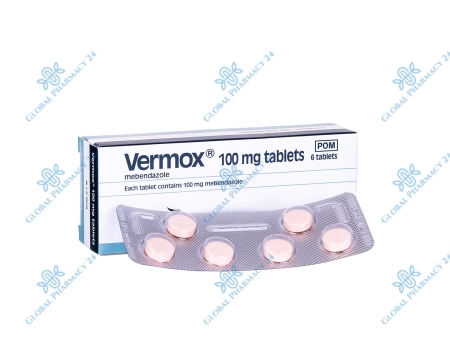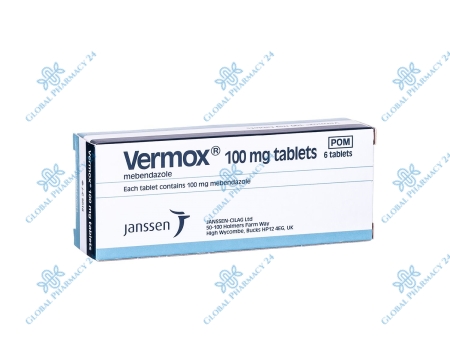| Aspect | Detail |
|---|---|
| Active Ingredient | Mebendazole |
| Formulation | Tablet |
| Dosage Forms | 100 mg, 500 mg |
| Duration of Effect | 24 to 48 hours |
| Primary Use | Treatment of parasitic worm infections |
Vermox Defined
Vermox (mebendazole) is a leading pharmaceutical product designed to combat parasitic worm infections. Acting as a broad-spectrum anthelmintic, it is effective against various types of worms, including pinworms, roundworms, whipworms, and hookworms. The drug interferes with the cellular tubulin formation of worms, impairing their glucose uptake and leading to their eventual death.
Developed to offer a targeted approach in the eradication of intestinal and tissue parasites, Vermox has become a cornerstone in anti-parasitic therapy. Its ease of administration and the option of low-dosage treatment cycles make it a preferred choice for patients of all ages, ensuring broad accessibility and compliance.
Understanding Vermox
Vermox's formulation contains mebendazole, which specifically targets the metabolic pathways of worms. Unlike other treatments that may have broad-spectrum activity but lesser specificity, Vermox ensures minimal absorption in the human body, leading to fewer side effects and making it safe for use in children and adults alike.
The Making of Vermox
Developed through extensive research into anthelmintic compounds, Vermox's active ingredient, mebendazole, was synthesized to maximize efficacy against parasites while minimizing side effects in humans. Its development marked a significant advancement in parasitic treatment options.
The Mode of Action of Vermox
Vermox works by selectively inhibiting the synthesis of microtubules in parasitic worms, disrupting their essential functions. This mechanism effectively starves the worms, leading to their death without significant absorption or impact on the human host.
The Therapeutic Power of Vermox
Vermox stands out for its efficacy in treating a broad range of parasitic infections. The therapeutic benefits of Vermox extend beyond its primary indication, offering potential relief in various parasitic challenges. Its mode of action ensures that parasites are effectively targeted, with minimal disruption to the patient's normal bodily functions.
Among its advantages, Vermox is recognized for its ability to provide comprehensive treatment solutions within a short duration. The drug's effectiveness, combined with its safety profile, has established it as a preferred option in clinical settings, offering a reliable pathway to recovery for those affected by parasitic infections.
Clinical Indications for Vermox
Vermox is clinically indicated for the treatment of several parasitic worm infections, including but not limited to Enterobius vermicularis (pinworms), Trichuris trichiura (whipworms), Ascaris lumbricoides (roundworms), and Ancylostoma duodenale (hookworms). Its broad-spectrum activity ensures comprehensive coverage against common and less frequent parasitic infections.
Vermox in the Fight against Parasites
In the fight against parasites, Vermox offers a potent and direct approach, disrupting the life cycle of worms and ensuring their elimination. Its targeted mechanism of action allows for effective treatment outcomes, reducing the burden of parasitic infections on affected populations.
Beyond Parasites: Other Vermox Uses
Research has explored Vermox's potential in addressing conditions beyond traditional parasitic infections. Its antitumoral properties are under investigation, highlighting the drug's versatility and its possible role in broader therapeutic applications.
Weighing the Benefits and Drawbacks of Vermox
- Pros:
- Effective against a wide range of parasitic worms
- Minimal absorption in the human body, reducing systemic side effects
- Suitable for adults and children
- Cons:
- Potential for mild gastrointestinal side effects
- Not recommended for use during pregnancy, especially in the first trimester
Instructions for Proper Vermox Use
Proper usage of Vermox is crucial for achieving the desired therapeutic outcomes while minimizing the risk of side effects. It is important for patients to follow the prescribed dosage and duration of treatment meticulously. Vermox is typically administered as a single dose or as part of a short treatment cycle, depending on the type and severity of the infection.
Adherence to the prescribed regimen enhances Vermox's effectiveness and reduces the likelihood of resistance development among parasitic worms. Patients should consult their healthcare provider for specific instructions tailored to their individual needs and condition.
Determining the Right Dosage
The appropriate dosage of Vermox varies based on the type of infection, the patient's age, and their overall health status. Generally, a single dose is effective for treating uncomplicated infections, while more persistent infections may require a longer course of treatment.
Dosage Adjustments: Individual Factors
Individual factors, including body weight, the severity of the infection, and co-existing medical conditions, may necessitate adjustments to the standard Vermox dosage. Healthcare providers will determine the most effective treatment plan for each patient.
Navigating Vermox Side Effects
While Vermox is generally well-tolerated, some patients may experience side effects, most of which are mild and transient. Common side effects include stomach pain, diarrhea, and nausea. Awareness and understanding of these side effects can help patients manage them effectively and maintain their course of treatment without undue discomfort.
It is essential for patients to communicate with their healthcare provider if they experience any side effects, particularly if they are severe or persistent. In most cases, side effects can be managed with simple interventions, ensuring that treatment can continue as planned.
Recognizing Common Side Effects
Common side effects of Vermox include gastrointestinal discomfort, such as abdominal pain, diarrhea, and nausea. These symptoms are typically mild and resolve without the need for medical intervention.
Managing Vermox Side Effects
Management of side effects may involve symptomatic treatment, such as hydration for diarrhea or over-the-counter medications for stomach pain. Patients should consult their healthcare provider for advice tailored to their specific symptoms and situation.
When Side Effects Signal an Emergency
Rarely, Vermox can cause severe allergic reactions or other serious side effects. Symptoms such as difficulty breathing, severe rash, or swelling of the face and throat require immediate medical attention as they may indicate a life-threatening condition.
Interactions and Cautions with Vermox
As with any medication, Vermox may interact with other drugs, dietary elements, or existing health conditions. Patients should inform their healthcare provider of all medications and supplements they are taking to avoid potential interactions. Additionally, certain health conditions may influence the safety and efficacy of Vermox, necessitating adjustments to the treatment plan.
Special caution should be exercised when administering Vermox to individuals with liver conditions, pregnant women, or those planning to become pregnant. In these cases, the benefits of treatment must be carefully weighed against the potential risks.
Drug Interactions with Vermox
Vermox can interact with certain medications, potentially affecting their efficacy or increasing the risk of side effects. It is crucial for patients to provide a complete list of their current medications to their healthcare provider.
Important Dietary Guidelines
While no specific dietary restrictions are associated with Vermox, maintaining a balanced diet can support overall health and recovery during treatment. Patients should follow any dietary advice provided by their healthcare professional.
Co-existing Health Conditions and Vermox
Patients with pre-existing liver conditions or compromised liver function may require special consideration and monitoring while taking Vermox. Healthcare providers will evaluate the risks and benefits in such cases.
Vermox: Considerations for Pregnancy and Nursing
Vermox is classified as a pregnancy category C drug, indicating that it should be used with caution during pregnancy, especially in the first trimester. The decision to use Vermox during pregnancy or while nursing should be made in consultation with a healthcare provider, considering the potential benefits and risks.
Final Words on Vermox
Vermox has proven to be an effective and valuable tool in the fight against parasitic infections, offering relief to millions worldwide. Its targeted action against parasites, combined with a favorable safety profile, makes it a preferred choice for patients and healthcare providers alike. By adhering to prescribed guidelines for use and monitoring, patients can maximize the benefits of Vermox while minimizing the risk of side effects or complications.
As with any medication, the journey with Vermox should be guided by professional medical advice, ensuring that it is used safely and effectively. The information provided here aims to support, not replace, the relationship that exists between patients and their healthcare providers.
A Quick Recap
Vermox (mebendazole) is a safe and effective treatment for various parasitic worm infections, offering a straightforward approach to eliminating parasites with minimal side effects. Proper use and adherence to guidelines are crucial for achieving the best outcomes.
Personal Views on Vermox
In the broader context of parasitic infection treatment, Vermox represents a significant advancement, combining efficacy with safety to improve patient outcomes. Its role in global health continues to be pivotal, highlighting the importance of accessible and effective treatments in combating parasitic diseases.
FAQs Vermox
What is Vermox used for?
Vermox is used to treat infections caused by worms such as whipworm, roundworm, hookworm, and pinworm.
How does Vermox work?
Vermox works by killing sensitive parasites and their eggs. It stops the parasites from absorbing glucose, which they need to survive.
What are the common side effects of Vermox?
Common side effects of Vermox include stomach pain, diarrhea, nausea, vomiting, dizziness, and headache. If any of these effects persist or worsen, notify your doctor promptly.
Can Vermox be used during pregnancy?
Vermox should only be used during pregnancy when clearly needed. It is important to discuss the risks and benefits with your doctor before taking Vermox if you are pregnant or planning to become pregnant.



















